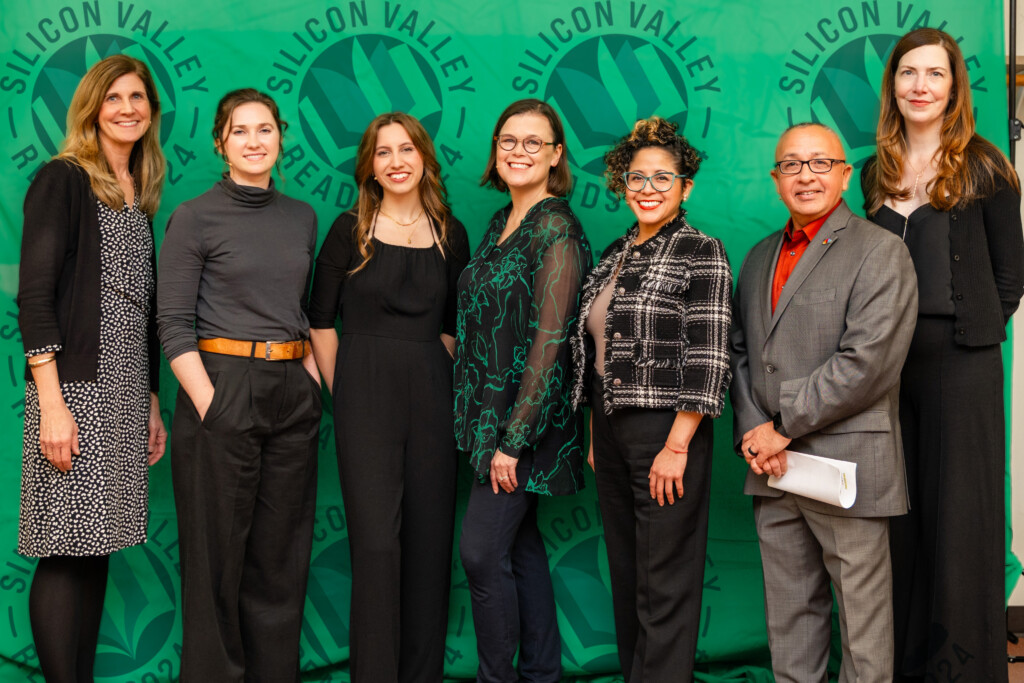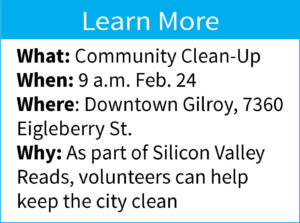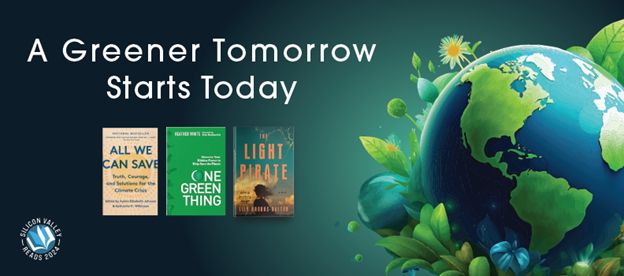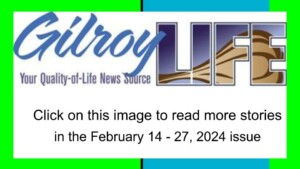Nonprofit profile: South Valley Reads features environmental topics
Theme for 2024 is “A Greener Tomorrow Starts Today”
![]()

From left: Jennifer Weeks, county librarian; Lily Brook-Dalton, author “The Light Pirate;” Alexandria Villasenor, youth climate activist; Heather White, author “One Green Thing;” Favianna Rodriguez, activist/artist; Damian Trujillo, NBC News reporter; and Jill Bourne, library director, city of San Jose. Photo courtesy Silicon Valley Reads
By Keira Silver
 The Silicon Valley Reads literary engagement program turned a new page this year with novels and nonfiction books about environmentalism issues.
The Silicon Valley Reads literary engagement program turned a new page this year with novels and nonfiction books about environmentalism issues.
Sponsored by the Santa Clara County Library District, the annual program hosted its 2024 kickoff event Jan. 31 at the De Anza College Visual and Performing Arts Center in Cupertino. The event drew a full audience of book fans and environmentalists to hear the panel of four women authors and view eco-friendly artwork showcased in the college’s Euphrat Museum.
This year’s theme is “A Greener Tomorrow Starts Today.” Members of the panel wrote books varying from self-help to fiction to describe the impact of the environment on humanity.
Damian Trujillo, an NBC Bay Area News Reporter, served as the host. He grew up in the Salinas Valley as a farmworker and hosts and produces “Comunidad Del Valle,” which airs on Telemundo.
While providing jokes to keep the audience engaged, Trujillo asked each author about their work and their thoughts on local and global environmental situations.
Lily Brooks-Dalton wrote the novel The Light Pirate, a “Good Morning America” book club selection and a New York Times Editor’s Pick. Asked about her book’s connection to environmentalism, she described her own experiences with natural disasters and her book’s fictional perspective.
 “I started writing the book in 2016, before Hurricane Maria,” she said. “I think each of the characters in the book are reacting in really different ways to the reality unfolding all around us.”
“I started writing the book in 2016, before Hurricane Maria,” she said. “I think each of the characters in the book are reacting in really different ways to the reality unfolding all around us.”
Brooks-Dalton shares all of her characters’ perspectives in her novel. She believes emotions should come first when trying to create a solution to climate problems.
“For me, I am a little bit of a cynic,” she said. “I find it difficult to feel hopeful. But that’s why I write these stories, because I think it’s important to confront that.”
Asked how individuals can get involved with creating environmental change, Brooks-Dalton said everyone has something different to provide.
“All the problems we see (and) find ourselves facing, we created together,” she said. “It only makes sense a solution has to be created in a similar way. We all have to be on-board to undo these errors we have allowed to continue.”
The author of One Green Thing, Heather White is a Montana-based conservationist and spokesperson on climate issues. After working with Al Gore on his 2000 presidential campaign, she launched the nonprofit OneGreenThing to handle the climate crisis through positive change.
Click HERE to view the video of the Silicon Valley Reads talk
“I knew I needed to create a way for more people to see themselves in the climate movement,” she said. “You don’t need a Ph.D. to be part of this movement. Everyone is welcome (and) needed. This is the biggest challenge of our time. We all have a unique role to play, and my calling is to find theirs.”
White believes understanding one another’s opinions on the issue is extremely important in dealing with environmentalism.
“I do have compassion for the climate-deniers,” she said. “We need to bring people in, and I know a lot of people who want to get involved but are afraid of doing it wrong. We need to be compassionate. Ask the young people in your life what they think about the future we’re leaving them. Young people want to be part of the solution, and it’s up to us to help them.”
 White believes a dialogue by society needs to be held about the future and its impact on the next generation.
White believes a dialogue by society needs to be held about the future and its impact on the next generation.
“It’s time for us to start shifting the narrative,” she said. “We need to start having that conversation because we can build something beautiful that our future loved ones will thank us for.”
Alexandria Villaseñor is a high school senior climate change activist and co-author of the book All We Can Save. After experiencing at 13 the effects of Butte County’s deadly Camp Fire in November 2018 that destroyed the community of Paradise, she began a lone climate strike with the Fridays for Future movement in front of the United Nations Headquarters in New York City. In 2019, she founded Earth Uprising International, and in 2020 she addressed the Democratic National Convention.
When asked about her impact as a youth striking in New York City, Villaseñor commented on how young people gathered together to create change. She believes there are still some challenges with youth trying to gather momentum for the growing climate change movement.
 “It was a very impactful moment because there was so much momentum where young people really saw a way they could get involved,” she said. “It felt very accessible for people to get involved. We’re still finding ways to take action and make our voices heard.”
“It was a very impactful moment because there was so much momentum where young people really saw a way they could get involved,” she said. “It felt very accessible for people to get involved. We’re still finding ways to take action and make our voices heard.”
Villaseñor will be studying English at Harvard in the fall. She has experienced frustration with balancing activism and academics, finding the contrast interesting in relation to the future.
“It’s almost like I’m justifying why I’m being an activist within the classroom,” she said. “It goes back to just the people and community and friends I’ve made through activism. (They) are really the reason why I haven’t fully burnt out. I have this network of young people from all around the world.”
Favianna Rodriguez is a cultural strategist, artist, and co-author of All We Can Save. She has inspired audiences at the United Nations Climate Summit, Sundance Film Festival, Smithsonian, and Google. She believes cultural environmentalism is present in various communities worldwide.
“We actually have to shift from an extractive economy to a regenerative economy where we value all people,” she said. “We honor everyone and everyone’s health, and I think that’s what storytelling can do so powerfully.”
Rodriguez spoke on how her values for the future focuses on collaboration between humans and the environment. She said it’s vital for people to have values with environmentalism, and literacy can impact information on the issue.
“I want to live in a world where all human beings can thrive in harmony with nature,” she said. “Librarians are on the front line of truth-telling.”
Details: www.siliconvalleyreads.org.
Keira Silver is a senior at Christopher High School. She wrote this story with mentorship from publisher Martin Cheek.
